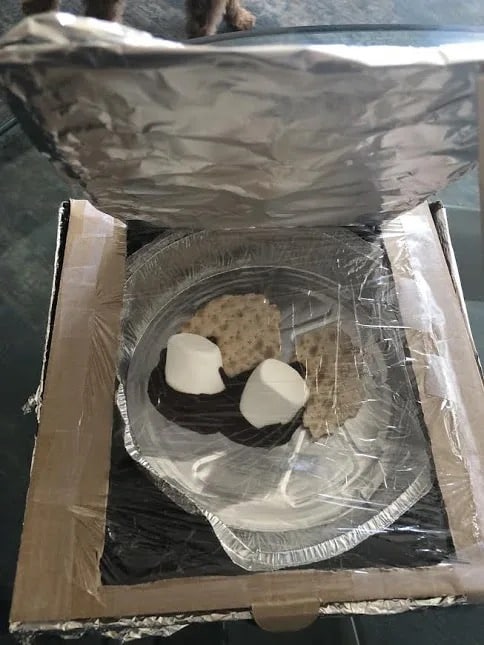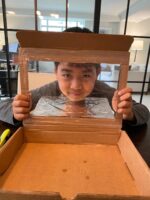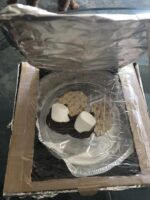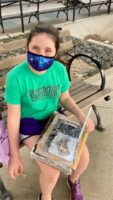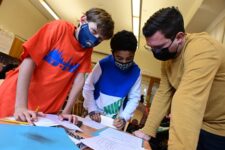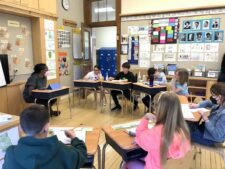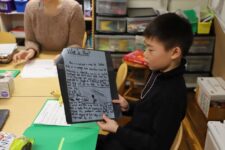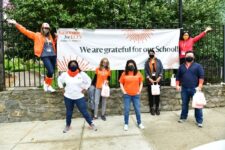Sloan L. ’28 is gearing up for the big reveal. “Okay, so after an hour and thirty minutes of sitting in the sun, this is what happened.”
She brings out a box, pops open the lid, and pulls out a plastic plate on which there is a viscous white goo. Running her finger through the substance, she notes, “It is definitely melted. It’s very warm. It did not get liquid-y, but it’s still really, really melted, so I would say this totally worked.”
The box that Sloan holds in her hands is a solar oven: the culmination of what 5th Graders at Ethical Culture have spent months gearing up to make in their STEAM classes. As a project that combines a rigorous approach to theory and experimentation with a playful spin, it epitomizes several of ECFS’s tenets of progressive education — here’s how.
Challenging our students to combine theory with practice
In creating a project for 5th Graders to work toward throughout most of the academic year, Heather Sherman, Science Teacher, designed her curriculum as a puzzle: Without giving away what the final project would be, she led her students through a series of experiments that would provide them with the clues they would need to build a solar oven. Initial experiments focused on identifying when and where the sun’s rays are strongest; successive ones focused on measuring how an object’s surface temperature varies according to its color and testing out how different materials optimize insulation. When at last all the puzzle pieces were in place and the keystone project was unveiled, the 5th Graders had the rich knowledge they needed to dive in.
Making science playful
Science doesn’t need to be all complex equations and rote memorization — at ECFS, it can be a lot of fun. Sherman saw the solar oven as an opportunity to spark an interest in both students who like to dive deep into science and those who like to tinker or make things with their hands.
What students chose to heat in their ovens was playful, too. Some photographed themselves eating — and enjoying — the chocolate chips and marshmallows they melted in their ovens: markers of sweet success.
Keeping projects responsive to student resources and interests
As a starting point, Sherman provided her students with boxes to use in their final product, but they were free to adapt and improvise as they saw fit. Over Spring Recess, the 5th Graders got to work fashioning shoeboxes, construction paper, plastic wrap, tin foil, and more into functional ovens, coming up with dozens of unique iterations on the same basic concept.
Sherman also wanted to give students the power to share out the results of their project in whatever way most appealed to them. Like the ovens themselves, their responses — videos, photos, slideshows, and written responses — were just as varied.
Empowering students to try, and try again
Though the students understood the scientific principles undergirding their devices, some of them still ran into snafus and unexpected outcomes — a natural part of experimentation. Sherman sees the process of trial and error as one of the highlights of the whole project: “I loved when they had the reflection of ‘It didn’t work, but then…’” she says. “Just having them honor their failure as something that’s positive.”
The satisfaction that 5th Graders derived from completing the project demonstrates just how much they enjoyed the process. “I think that the thing that surprised me the most was that it actually worked!” writes Kai L. ’28. “I did not doubt the science; I doubted my own abilities. The fact that I was actually able to melt chocolate just blows my mind.”
Kai may have doubted his ability to fashion a solar oven, but we’ve never doubted our 5th Graders — and their futures as engineers in the making.
